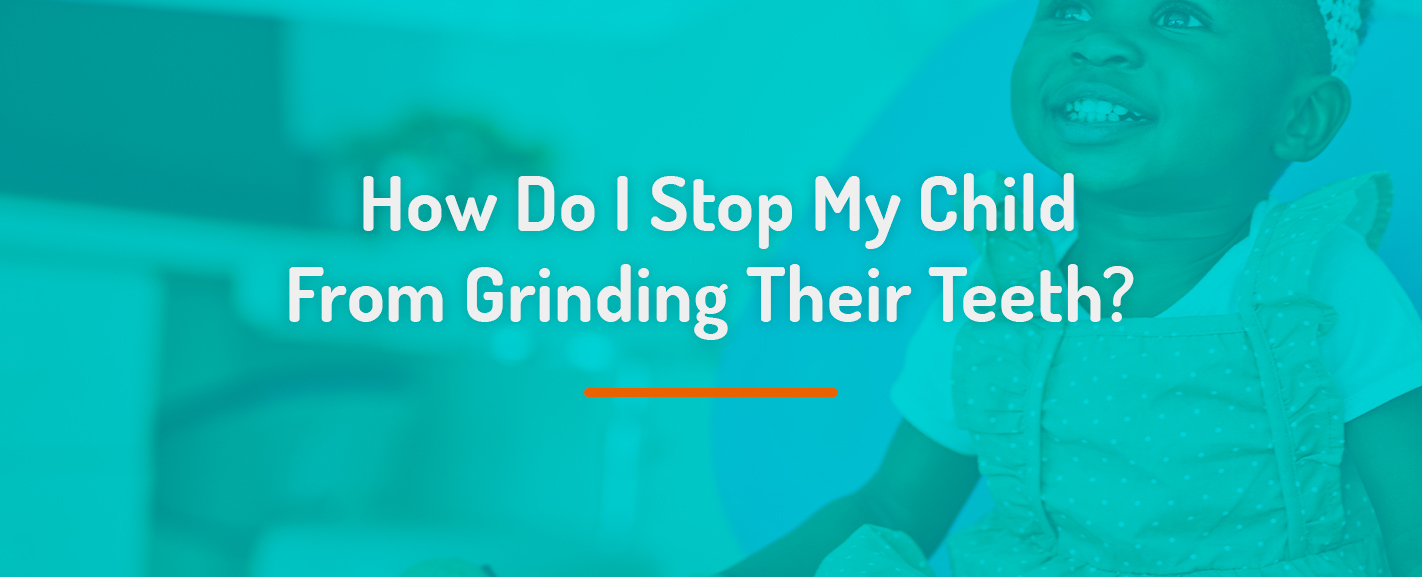Lots of kids grind their teeth, especially after they’ve fallen asleep at night. Teeth grinding, also known as bruxism, can cause oral health problems, along with headaches, joint pain and other symptoms. Its causes vary, and several different issues can trigger it. It’s important to address teeth grinding right away and use methods to prevent it. If you suspect your child is grinding their teeth, be sure to see a pediatric dentist.
Call to Schedule A Dental Appointment
How to Tell if My Child Grinds Their Teeth
Teeth grinding is more common in young children than you might think — an estimated three out of 10 kids younger than 5 years old grind their teeth. Since most teeth grinding happens when your child is asleep, it can be challenging to catch it. A few signs are common indicators of grinding, such as:
- Chips in teeth: If your kid’s teeth show chipping, it may be due to teeth grinding. The tension can cause little pieces of tooth to chip away.
- Fractures lines: Fracture or “craze” lines are tiny hairline cracks that can result from teeth grinding.
- Worn enamel: The stress of grinding can wear down tooth enamel the same way sugary or acidic foods do.
- Increased sensitivity: If your child complains of toothache when eating hot or cold foods, they might be grinding their teeth.
- Unexplained head or earaches: Headaches and earaches can have many different causes, but if you’ve ruled out other possibilities, teeth grinding could be the culprit.
- Jaw pain: Teeth grinding can also lead to jaw pain. If your child says they’re experiencing pain in their jaw, they might be grinding their teeth.
While all of these signs might point to teeth grinding, the easiest way to confirm the theory is to listen for yourself. Wait until your child falls asleep and listen for the sound of grinding teeth. It might sound like squeaking, crunching or scraping. If you also hear their jaw popping or clicking, that means the movement has aggravated the jaw joints. If that’s the case, your child has likely complained of jaw pain.
What Causes a Child to Grind Their Teeth?
Teeth grinding has many different causes in both children and adults. Since it usually happens while someone is asleep, it can be a challenge to determine the cause, but it’s often triggered by one or more of the following issues.
Stress and Anxiety
Stress and anxiety can lead to teeth grinding or jaw clenching at night, especially for older teens (and adults too). This happens because anxiety increases adrenaline, which mobilizes energy throughout the body. Studies have found an association between anxiety levels and a tendency to grind teeth.
Hyperactivity
Along the same lines, teeth grinding can be related to hyperactivity. In some patients, it can be linked to attention deficit hyperactivity disorder (ADHD). The two often go hand-in-hand, but not always. Teeth grinding does not necessarily mean a child has ADHD. If you suspect your child has ADHD, please contact your pediatrician.
Certain Medications
Some medications, especially antipsychotics, can cause bruxism. If your child or teen takes an antidepressant or other antipsychotic, it could be causing teeth grinding. Other movement disorders might also happen, like tongue rolling or lip smacking. If you think there’s a connection, speak with your pediatrician.
Physical Pain
In children, a common cause of teeth grinding is the pain of misaligned or growing teeth. Grinding can temporarily relieve pain, like rubbing a sore muscle. Children whose teeth are growing might grind for this reason.
Can Grinding Teeth Cause Problems?
Persistent teeth grinding can cause problems. It can damage a child’s teeth, leading to weakened enamel or cracks and fissures. Fracture lines can pose a higher risk of developing cavities. Beyond oral health, teeth grinding can cause other concerns. In some cases, it leads to pain in the jaw or face, as well as jaw joint problems. Bruxism can also cause misaligned teeth, requiring orthodontic services. However, teeth grinding, especially in younger patients (toddlers and elementary school-aged kids), may lead to zero problems at all. Many children grind their teeth with no adverse effects.
What to Do if My Child Grinds Their Teeth
If you’re wondering how to stop your child from grinding their teeth at night, you can take a few measures to address the problem and prevent future teeth grinding. If you suspect tooth grinding, the first thing you should do is take them to a pediatric dentist, who will identify any tooth damage. They may also be able to provide a nightguard or other solution.
Ways to Prevent Teeth Grinding in Children and Teens
Here are some steps you can take to prevent teeth grinding in children and teens:
- Skip the caffeine: Since teeth grinding can result from hyperactivity, caffeine is a no-go. Cut back on your child’s caffeinated drinks and foods, like sodas or chocolate.
- Try relaxation exercises: Relaxation exercises can help a child relieve tension and anxiety before falling asleep. Try meditation or stretching routines before bed.
- Encourage activity: If your child’s teeth grinding is related to hyperactivity, getting plenty of exercise throughout the day can help prevent it.
- Ensure good oral hygiene: Always help or encourage your child to practice good oral hygiene, brushing twice a day and flossing at least once a day.
- Ask for a nightguard: Your child’s dentist may give them a mouthguard to prevent tooth damage by providing a barrier between the rows of teeth. It is important to note, nightguards are best suited for teen patients who no longer have any baby teeth.
- Look into orthodontics: For some children, misaligned teeth cause pain which leads to tooth grinding, or their tooth grinding can cause misaligned teeth. Look into corrective orthodontics for kids to prevent teeth grinding and its impact on your child’s smile.
Ways to Treat the Effects of Teeth Grinding
If your child grinds their teeth, they might experience jaw pain, headaches or other effects. You can treat these symptoms as needed. A cold compress can alleviate jaw or face pain. Speak with your pediatrician before using pain medication.
It can also help to avoid tough, chewy foods, like jerky meat or raw carrots, which make the jaw work hard. If your child’s tooth grinding has led to tooth damage, your pediatric dentist will address it.
Rest assured, in most cases, teeth grinding is self-limiting, meaning it will go away on its own, with no treatments or intervention.
Schedule an Appointment With Fox Kids
Teeth grinding is a common issue for kids, especially as their teeth are growing in. It may lead to tooth problems, like chipping or enamel-wearing. It may also cause jaw and face pain or headaches and earaches. These issues are more common in teenage patients. Depending on its cause, plenty of solutions are available to address the issue. Adjusting your child’s diet and routine can help, as can good oral hygiene and orthodontics.
Call Our Office Today
If you suspect your child is grinding their teeth, connect with us at Fox Kids Dentistry and Orthodontics. Our pediatric dentist and orthodontist specialize in caring for kids, creating a positive and compassionate experience. We value building trust and confidence in our patients. Our combined pediatric dental and orthodontic practice is convenient for parents, and we’ll address your child’s teeth grinding with a personalized solution. Schedule your appointment with Fox Kids Dentistry & Orthodontics today.

